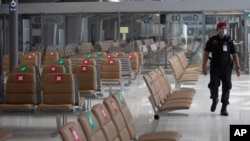Economists and industry insiders predict a slow rebound for Thailand's all-important tourism sector as one of the world's top travel spots slowly opens its borders after more than three months of virus-induced lockdown.
While some European countries, with far more confirmed COVID-19 cases and deaths, have already begun welcoming visitors from the rest of the continent and beyond, Thailand is moving with much more caution.
The government says the first few thousand non-essential foreigners were cleared for arrival as of July 1 — mostly permanent residents and work permit holders, investors, teachers, students and those seeking medical care.
The country is eyeing the return of tourists from a select few Asian countries in August or September, just ahead of peak tourist season. Even then the visitors will be kept on a short leash and likely made to download phone apps that track their moves and to stick close by their hotels.
The size of Thailand's tourism sector has made the pandemic especially hard on the country. The World Bank predicts that the Thai economy will see one of the sharpest contractions in the East Asia and Pacific region this year, at about 5%, throwing an estimated 8.3 million people out of work.
"And the main reason for that is that Thailand has a large exposure as a tourism hub; close to 15% of GDP is tourism-related earnings," said Kiatipong Ariyapruchya, the World Bank’s senior country economist for Thailand.
Thailand was the 8th most-visited country in the world last year, welcoming 39.8 million foreign guests, according to the UN. In its own 2019 index, Mastercard named its sprawling capital, Bangkok, the world's most visited city.
It will take time to get the tourism sector humming again. World Bank economist Arvind Nair said the economy will need at least two years to recover, owing substantially to the "gradual normalization of tourism over the course of 2021."
The Travel Authority of Thailand is expecting to finish 2020 with 10 million foreign tourists at most, about a quarter of last year's total.
Numbers like that are setting the industry back some 10 to 20 years, said Marisa Sukosol Nunbhakdi, a vice president of the Thai Hotels Association, "so I think we're bracing for a very slow recovery."
The government is hoping to make up some of the lost business from abroad by trying to stimulate more domestic tourism with a number of incentives, from discounts on travel and accommodation to subsidies for tour companies that book trips for health care workers. Airlines are coming up with deals of their own.
"So hopefully that will bring in some income for hotels, but nowhere near normal levels at all," Sukosol said. "We need international income from tourists to be able to resuscitate the hotel sector."
The World Bank warned also that schemes to stimulate domestic tourism, while welcome for now, could backfire if misdirected and prolonged. It said they may fail to prove tempting enough to lure Thais still wary of the virus away from home.
The Hotels Association says about 8 of every 10 hotels in the country closed their doors to ride out the COVID-19 lockdown and that few of them have reopened to try and cash in on the domestic tourism push.
In Pattaya, a beach town on the Bay of Thailand popular with foreign tourists, the Sunbeam Hotel is not planning to throw its doors open again until November or December, choosing instead to wait for the return of foreign guests.
"For us [the] international market is around 80 to 85% of our total room occupancy..., so for us it's very, very important," said general manager Boonkerd Suksrikarn.
In a typical peak season, the Sunbeam could expect to fill anywhere from 75% to 85% of its 270 rooms on an average night. This season hotel officials are hoping it can fill half of them. Much like the World Bank, Boonkerd is not expecting numbers to return to normal for another two to three years.
"This year ... we'll be happy if we break even or make just a little bit of a profit," he said. "That's our goal — survival."
Before the lockdown, Thailand's hotels nationwide relied on international guests for nearly two-thirds of their business. While a vaccine will do much to draw many of them back, Sukosol says the industry can ill afford to wait that long. But she also understands the government's caution. Thailand has kept total confirmed infections below 3,200 thus far and gone more than a month without a locally transmitted case; Its leaders are keen to avoid importing a second wave.
"We only have one chance to recover," she said.




